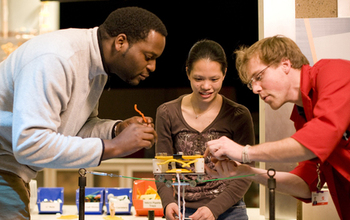News Release 15-046
NSB selects Museum of Science, Boston's National Center for Technological Literacy for its 2015 Public Service Award
Center champions public understanding of science and engineering

National Center for Technological Literacy is 2015 National Science Board Public Service awardee.
April 28, 2015
This material is available primarily for archival purposes. Telephone numbers or other contact information may be out of date; please see current contact information at media contacts.
Today the National Science Board (NSB) announced that the National Center for Technological Literacy (NCTL), created by the Museum of Science, Boston, is a recipient of its 2015 Public Service Award.
Launched in 2004, NCTL exhibits and teaches programs to visitors about science and engineering. In addition, the center pioneered engineering education curricula for K-12 schools nationwide. NSB is also recognizing the American Museum of Natural History with its Public Service Award this year.
The NSB is the policymaking body for the National Science Foundation (NSF), an independent federal agency that supports fundamental research and education across all fields of science and engineering.
"The center's innovative exhibits, programs and curricular projects have brought engineering, technology and science to millions of students across the country and provided teachers with the professional training they need for the 21st Century classroom," said Vint Cerf, chair of NSB's Committee on Honorary Awards.
Drawing 1.4 million visitors a year, the Museum of Science, Boston is one of the world's largest science centers and the first in the United States with a strategy and infrastructure to integrate engineering into schools and museums nationwide. Responding to a dearth of elementary engineering curricula in the U.S. school system, NCTL developed a unique curriculum that integrates engineering and technology with science, language arts, social studies and math via storybooks and hands-on design challenges.
With key funding by NSF, Engineering is Elementary is now the nation's largest elementary engineering curriculum, reaching over 77,000 teachers and nearly 7.7 million students across the country. Projects engage students in solving engineering problems--from creating water filters and solar ovens to designing windmills and submersibles. They learn the five-step engineering design process of ask, imagine, plan, create and improve, which focuses especially on the value of learning from failure.
"We are deeply honored to receive the National Science Board Public Service Award. We believe that a scientifically and technologically literate citizenry is critical," said Ioannis Miaoulis, president and director of the Museum of Science, Boston. "We also believe that engineering brings science and math alive so that children can learn to solve problems in our engineered world. Some of these children may also later pursue STEM careers and help to create the innovations that can improve our lives."
NSB will present NCTL and AMNH with its Public Service Award on May 5, 2015, during the NSF-NSB Annual Awards Ceremony held in Washington, D.C. Boston's Museum of Science President and Director Ioannis Miaoulis will attend the ceremony and accept the award on NCTL's behalf. NSB will also recognize its 2015 Vannevar Bush awardee, an individual with life-long scientific and public service contributions, and NSF will honor this year's Waterman Award recipient, an outstanding scientist aged 35 or younger.
All four 2015 awardees will give presentations during the NSB's May 5-6 meeting. The presentations will be open to the public at NSF in Arlington, Va., and also viewable via a live webcast. The two group awardees will each present on May 5 with the Vannevar Bush and Waterman awardees presenting on May 6. Presentation times, the webcast link and other details will be posted on NSB's website by the week of April 27.
Past recipients of NSB's Public Service Award--established in the late 1990s--include The Alfred P. Sloan Foundation, PBS television series NOVA and The Expanding Your Horizons Network.
About the National Science Board
The National Science Board is the policymaking body for the National Science Foundation. NSB also advises the president and Congress on science and engineering policy issues. The board's 24 members are drawn primarily from universities and industry and represent a variety of science and engineering disciplines. Selected for their eminence in research, education or public service and records of distinguished service, board members serve six-year terms. NSF's director is an ex officio 25th member of the board. Visit NSB's website for more information.
-NSF-
Media Contacts
Nadine Lymn, NSB, (703) 292-2490, email: nlymn@nsf.gov
The U.S. National Science Foundation propels the nation forward by advancing fundamental research in all fields of science and engineering. NSF supports research and people by providing facilities, instruments and funding to support their ingenuity and sustain the U.S. as a global leader in research and innovation. With a fiscal year 2023 budget of $9.5 billion, NSF funds reach all 50 states through grants to nearly 2,000 colleges, universities and institutions. Each year, NSF receives more than 40,000 competitive proposals and makes about 11,000 new awards. Those awards include support for cooperative research with industry, Arctic and Antarctic research and operations, and U.S. participation in international scientific efforts.
Connect with us online
NSF website: nsf.gov
NSF News: nsf.gov/news
For News Media: nsf.gov/news/newsroom
Statistics: nsf.gov/statistics/
Awards database: nsf.gov/awardsearch/
Follow us on social
Twitter: twitter.com/NSF
Facebook: facebook.com/US.NSF
Instagram: instagram.com/nsfgov


